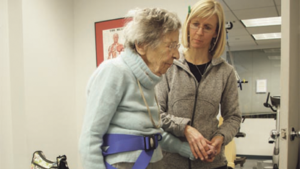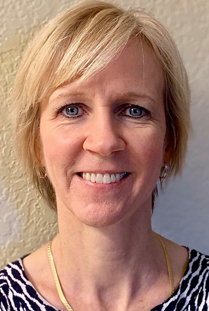As therapists, we’re facing heightened demands to work effectively with older adults in increasingly shorter amounts of time. We are constantly being asked to up our game.
The good news is that a great deal of new, clinically-applicable research has been published in the past few years. The bad news is that this abundance of research can actually make it more difficult to sift through to get to the information that we need most.
In this course, Linda McAllister pares down the research to the most clinically applicable nuggets that can produce the best patient results. But the true brilliance of this course is in its commitment not just to teaching new content, but to skill development.
Over 50% of the course is devoted to practicing the techniques presented.
Tests and interventions are too often overused because we know them so well and we’re comfortable using them. Incorporating new knowledge, assessments and protocols into our busy practice is difficult. This course puts new tools and protocols at your fingertips, so you’re comfortable implementing them right away.
Equipped with research findings, Linda interacts with group participants and allows time for practice of the new techniques.
This course has many wonderful home programs included that are directly based on the research studies.
Lab time focuses on using new evaluation tools and treatment protocols that address 7 major diagnostic conditions commonly encountered in the older population. You will learn how to address these conditions effectively at multiple levels of function:
- Deconditioning and generalized weakness
- Stroke
- Parkinson’s disease
- Peripheral neuropathy
- Hip fracture
- Balance and fall risk
- Multiple orthopedic conditions such as advanced osteoarthritis and thoracic kyphosis
A section of the course is devoted to each diagnostic condition and each of these sections includes assessments that are supported by rigorous research, are easily and quickly administered, and provide specific data that help us determine treatment plans and monitor progress. Examinations are definitely addressed, but the focus of this course is primarily on interventions that have proven to be highly effective when used with older adults.
You’ll take home over 50 new evidence-based intervention protocols for older adults that you can use immediately to get great results. Protocols that can be individualized, one-repetition maximum strength testing, effective exercise dosing, functional measures, and comorbidities will be discussed. The comprehensive manual includes easy-to-access summaries of recently published intervention protocols for clinical use, functional tools and references, and home programs for immediate use.
The surge of aging baby boomers gives us a rich opportunity as they enter our settings in unprecedented numbers. Join Linda McAllister to update your knowledge, skills and confidence in treating this population. Walk away with a toolbox full of research supported examination tools and intervention protocols and the ability to implement these innovations with confidence.
What Will This Course Give Me?
- New Intervention Techniques. You’ll take home over 50 new research-based intervention protocols that you can use immediately to get great results with older adult patients.
- Application skills. You’ll develop the skills needed to apply new, research supported evaluation and intervention techniques in your practice right away. Over 50% of the course is devoted to practicing the techniques presented.
- Patient motivation skills. Learn about Motivational Interviewing and how it can increase your patients’ participation in the treatment plan.
Day 1 (Eastern Time Zone)
9:00 AM- Introduction: demographics of aging, multi-system changes with aging, ageism
9:15 AM- Generalized weakness – a common sequela. Hospital-associated deconditioning and frailty. Hand-held dynamometry, one-repetition maximum testing, resistance training prescription for older adults. Lecture and lab practice.
10:45 AM- Break
11:00 AM- Strengthening protocols – Acute and post-acute interventions. High -intensity functional resistive training, power training and more. Lecture and lab practice.
12:00 PM- Acute and chronic stroke. Epidemiology, protocols/interventions including circuit training, timed gait speed trials, repetitive task practice, backwards walking training, motor imagery training, high-intensity walking training, and more. Lecture and lab practice.
1:30 PM – Lunch
2:00 PM- Parkinson’s disease: epidemiology, evidence-based interventions including auditory cueing, multidirectional stepping, sensorimotor agility exercise, dual – task training, Tai Chi, high-intensity aerobic training and more. Lecture and lab practice.
3:30 PM- Break
3:45 PM- Peripheral neuropathy interventions: Lecture and lab practice. Balance training, seated/standing/ walking exercise protocols.
4:45 PM- Functional tools and outcome measures: muscle performance/chair rise, endurance, static and dynamic balance, agility. Lecture and lab practice.
5:45PM- Putting It All Together – Discussion, questions and answers.
7:00 PM- Adjourn
Day 2 (Eastern Time Zone)
9:00 AM- Musculoskeletal conditions in the older adult: lecture and lab practice. Evidence-based protocols for osteoarthritis/advanced osteoarthritis of the knee, hip and shoulder, rheumatoid arthritis, thoracic kyphosis, osteoporosis, total knee replacement.
11:00 AM- Break
11:15 AM- Hip fracture: Demise is not inevitable with quality intervention! Evidence-based interventions including progressive strength training, home-based exercise protocols and more. Lecture and lab practice.
1:15 PM- Lunch
1:45 PM- Balance, Gait and Fall Risk. Lecture and lab practice. Researched protocols for balance, gait, vestibular training, task-oriented walking and more.
3:15 PM- Break
3:30 PM- Home programs that make a difference, including for lower-functioning older adults. Motivational interviewing. Lecture and lab practice.
4:30 PM- Complexities and common co-morbidities to consider
5:00 PM- Case studies: Showing skill, medical necessity and progress in our care.
6:00 PM- Putting It All Together – Discussion, questions and answers.
7:00 PM- Adjourn
Upon completion of this seminar, participants will be able to:
- Demonstrate evidence-based exercise protocols for a variety of diagnoses and conditions in the older adult population.
- Design exercise prescriptions, dosing and intensity for the older adult with a variety of impairments.
- List trends in demographics of the aging population in the United States.
- Compare and contrast common pathologic conditions in the older adult population referred to therapy settings.
- Use appropriate functional tools and measures for the older adult population.
- Identify factors which contribute to fall risk in older adults.
- Demonstrate evidence-based interventions to address fall risk in the older adult population.
- Individualize evidence-based protocols for older adults accounting for comorbidities, complexities, and motivational factors.
EDUCATIONAL CREDIT: A certificate of attendance for 20 contact hours of educational activity (20 CEUs or 2.0 CEUs depending on how your Practice Act determines CEUs in your state) will be awarded to registrants upon completion of the Live Webinar.
Great Seminars and Books is an Approved CE Provider for PTs and PTAs in OK, NY, IL, CA, TX, and NM and this Live Webinar provides 20 contact hours of continuing education. This course is approved for 20 contact hours for PTs/PTAs in MD, OH, NJ, MS, and LA. This course is approved for PTs and PTAs by the Florida Physical Therapy Association for 24 contact hours. This course meets the guidelines for approval in NC, TN, CT, ID, IO, KS, ME, MA, NH, NE, SD. This course is accepted for CEUs in: AK, AL, AR, DE, GA, HA, IN, MI, MT, ND, OR, PA, RI, UT, VT, VA, WI, WY, WA.
Have applied for approval with AOTA. This course is approved by the Florida Board of Occupational Therapy for 20 contact hours.
This course is not approved by ASHA or Board of Certification.
Any reference to or mention of state rules or regulations concerning continuing education requirements are true and accurate to the best of our knowledge at the time of print. If you have questions, please contact your board or regulating body.
If you do not see your state listed, please give our office a call at 877 794 7328.
WEBINAR
A webinar is live, interactive video course delivered over the Internet to your computer. You will be able to see, hear and interact with the course presenter. This live, webinar will utilize live instruction, demonstrative videos, power point slides and more. You will have an opportunity to ask questions during the seminar. A comprehensive handout will be made available to you after you register for the webinar. In many courses, demonstrative video will be used to further enhance your learning experience. All written content used in the presentation will also be made available to you for your personal use (Power Point Slides, Reference Materials etc.).
Financial Disclosure: Linda McAllister is a lecturer for GREAT Seminars. She receives payment from GREAT Seminars for the presentation of this course.
Nonfinancial Disclosure: No relevant nonfinancial relationship exists.
Content Disclosure: This course does not focus solely on any specific product or service.
Both Days - 20 contact hours
January 25-26, 2025 - $445.00
Day 1 Only - 10 contact hours
January 25, 2025 - $225.00
Day 2 Only - 10 contact hours
January 26, 2025 - $225.00
A post-test will be given at the end of Day 1 for the Day 1 materials and a Post-Test will be given on Day 2 for the Day 2 materials. A post-test score of 70% or more is considered passing. Scores of less than 70% indicate a failure to understand the material and the test will need to be taken again until a passing score has been achieved. For each day attended, you will receive a certificate of completion for 10 contact hours. If you attend both days of the Live Webinar, you will receive a total of 20 contact hours. Live Webinars allow presenter and participant interaction. The exam and course evaluation for these courses must be completed within 7 days of the event.

